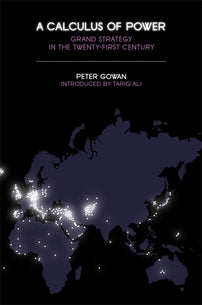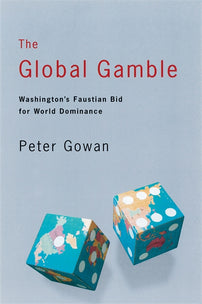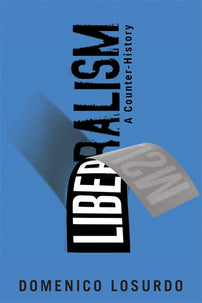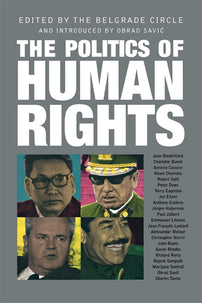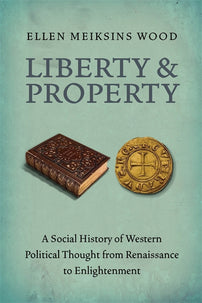The Origins of Atlantic Liberalism
The philosophical roots of rights-based liberal individualism lie in efforts to legitimate imperial expansion.

A Calculus of Power: Grand Strategy in the Twenty-First Century, published by Verso in 2010, collects essays written by activist and international relations scholar Peter Gowan for New Left Review between 1998 and 2009, the last decade of his life. Following Gowan's The Global Gamble, the essays here consider the construction of the post-Cold War world order and developments in American and European grand strategy, in pieces that focus on the Balkan crisis, the UN, realist theories of international relations, and the 2008 financial crisis, among other subjects.
The essay below, included in the book, was first published in NLR 8, March–April 2001, as a review of Richard Tuck’s The Rights of War and Peace: Political Thought and the International Order from Grotius to Kant (Oxford: Clarendon Press, 1999).
The past decade has witnessed an unprecedented ascendancy of rights-based liberal individualism as the legitimating ideology of the capitalist world. No longer just the theme song of the American way of life, it has become the official creed of the European Union and the mobilizing doctrine of Western military intervention around the world, from the Middle East to the Balkans, from sub-Saharan Africa to the Caribbean. This is a discourse that links institutional and cultural features internal to the Atlantic states to postulated universal interests of humanity as a whole. All human beings, it argues, are individuals entitled to certain rights, and while the advanced polities of the West may respect a far richer and deeper range of these than anywhere else, liberals have a duty to the rest of humanity to advance and promote minimal human rights everywhere and to strike down those who would deny them. What are the historical sources of this outlook? It has long been believed that this strand of political thought derives from theories of Natural Law and associated conceptions of social contract dating back to the seventeenth century, above all in England — a tradition that combined, within a single framework, a universalist notion of the nature and entitlements of humanity with a specific normative theory of what might constitute a civilized polity for the advanced countries. Out of ideas of the individual moral agent, possessed of attributes common to all mankind, there developed — according to a standard schema — notions of government by consent and, eventually, agreed rules of international conduct.
Richard Tuck’s Rights of War and Peace is a work of brilliant iconoclasm that leaves little of this conventional view of the origins of modern liberalism standing. It starts by contrasting two quite different conceptions of warfare in the sixteenth century, embodied respectively in the Italian humanist Alberico Gentili, a Protestant exile who became Regius Professor of Civil Law at Oxford ("one of the most important and interesting figures ever to teach at that university") a year before the Armada, and his contemporary, the Spanish Thomist Luis de Molina, Professor of Philosophy and Theology at Évora (whose modern editor is Manuel Fraga Iribarne, founder of Spain’s current ruling party). Molina, an heir of mediaeval scholasticism, drew on traditions of Christian doctrine and Greek philosophy to set tight bounds around a permissible resort to arms — essentially, war was legitimate only if its aims were defensive or reparatory. Wars in pursuit of glory or pre-emptive attacks were expressly forbidden, and aggression against barbarians was unjustifiable.
Gentili, on the other hand, an admirer of Machiavelli and associate of Bacon, invoked Roman orators and historians to justify wars of self-preservation — in which each side would naturally claim its cause was just — that included not merely deliberate provocation of hostilities but a pre-emptive strike to cut down a potential enemy before it reached its prime. To this licence for military aggression within Europe, Gentili added a quite new one for colonial conquest outside it. War, he argued, could legitimately be waged on behalf of "human society" as a whole, against those whose practices defied common morality, to punish them for their outrages. "The cause of the Spaniards is just when they make war upon the Indians, who practised abominable lewdness even with beasts, and who ate human flesh, slaying men for that purpose. For such sins are contrary to human nature, and the same is true of other sins recognized as such by all except haply by brutes and brutish men. Against such men, as Isocrates says, war is made as against brutes." Not only this: colonial conquest was also perfectly in order, if lands were empty or unused. "The seizure of vacant places is regarded as a law of nature . . . Even though the lands belong to the sovereign of that territory, yet because of that law of nature which abhors a vacuum, they will fall to the lot of those who take them."
It was this heritage that Hugo Grotius, the central figure of Tuck’s account, developed into a full-blown theory of international law. In doing so, he could draw on another source — the transformation of moral theory effected by late Renaissance sceptics like Montaigne and Charron, who had argued that wisdom lay in repudiation of all passionate ideological commitments, whether religious or patriotic, in the interests of a cool self-preservation. For Tuck, Grotius is the real founder of modern liberalism because it was he who turned this quietist moral stance into the theoretical basis of a positive political philosophy. In this enterprise, his starting-point was the assertion that there were two fundamental laws of nature: the right of every man to defend his life and avert any injury to it; and the right of each individual to obtain and keep for himself "those things which are useful to life." Self-preservation takes precedence over the rule that we should not inflict harm on others. As Grotius put it: "by nature’s ordinance, each individual should be desirous of his own good fortune in preference to that of another." The only natural basis for someone to help anyone else was the principle of returning like for like: punish those who injure you and reward those who assist you. Consequently, Grotius endorsed Horace’s famous maxim that "expediency is the mother of justice and equity." As Tuck remarks, the new doctrine offered "an extremely minimal picture of the natural moral life." But this thin sociability allowed Grotius to make his key theoretical move. Relations between natural individuals could be modelled on those between states, as sovereign powers whose interactions were governed by the moral parsimony of only the most restricted rules of international conduct.
This fateful equation, Tuck shows, did not spring out of mere logical rumination. It was a direct product of Grotius’s concern to justify Dutch commercial imperialism in Asia — his first major work being a treatise defending the hugely profitable seizure of a Portuguese bullion shipment by a captain of the East India Company, who was also his cousin, in 1603. If there was no ultimate ethical difference between individuals and states, then "private trading companies were as entitled to make war as the traditional sovereigns of Europe." The way was open for plunder in the Indian Ocean and the seizure of forts in Amboyna and beyond. Nor was this all. States, conversely, enjoyed the same rights of retribution as individuals in a state of nature. The sociability postulated by Grotius might be thin, but it was universal, dictating a moral law applicable to all humanity, whose infractions it was not only legitimate but incumbent to punish, regardless of whether or not they harmed the power that exacted retribution for them. As Grotius forthrightly expressed it: "War is lawful against those who offend against Nature; which is contrary to the Opinion of . . . Molina and others, who seem to require, towards making a War just, that he who undertakes it be injured in himself, or in his State, and he has some jurisdiction over the Person against whom the War is made."
Grotius had no difficulty enumerating the various barbaric customs beyond the confines of Christianity that warranted military intervention in the name of humanity. Among them, he noted, there could be no doubt that war was justified against "those who kill strangers that come to dwell amongst them." For if European colonists should respect the local jurisdiction of native rulers who accepted settlers, those who did not had violated a law of nature mandating cultivation of "barren land," and should be punished. Grotius inserted this clause as the Dutch shifted from purely commercial to territorial imperialism, planting settlements in Manhattan and Guyana. "The central reason why Grotius had developed his argument in this direction," Tuck writes, was that "the Dutch had begun to change the character of their activity in the non-European world since his earlier works, and in particular had begun to annex territory."
Tuck goes on to show how Hobbes radicalized Grotius’s lead, basing his theory of sovereignty on a much grimmer vision of minimum sociability — a state of nature permeated by fear, and mimicking even more closely inter-state relations as the domain of constant war of all against all. Hobbes, too, was keenly interested in colonization schemes, recommending them as an outlet for surplus population at home: settlers were not, he generously remarked, "to exterminate those they find there, but constrain them to inhabit closer together, and not range a great deal of ground, to snatch what they find." From here it was a short step to Locke’s more comprehensive doctrine, expounding the right to take and kill slaves, to occupy land in the Americas for agriculture, ending its use by native hunters and crushing resistance to colonial settlement.
Locke, unlike Hobbes, was also a keen proponent of punitive expeditions to wage war on offenders against the laws of nature. Relying on circumstantial inference rather than direct evidence, Tuck argues that his treatment of these themes in the Second Treatise on Government was, in large measure, a rejoinder to the critique of them by the one major seventeenth-century thinker who stood outside this tradition — the German scholar Samuel Pufendorf. An employee of the Swedish state who ultimately migrated to Prussia, Pufendorf based his account of international law on a morally richer conception of human sociability, whose more binding force forbade pre-emptive attacks, ruled out punitive wars, and repudiated colonial rapine. These positions had a following in the weaker states of Northern Europe, unable to pursue a path of overseas expansion; later they were echoed by Leibniz’s disciple, Christian Wolff. Rousseau and Kant, on the other hand, reverted to quasi-Hobbesian premises, reaching opposite conclusions: Rousseau discounting any pacification of inter-state relations, Kant seeking an escape from the realities of endemic warfare, for which Pufendorf was no more than a "sorry comforter," in the indeterminate future of a cosmopolitan peace once princes had left the stage — pending which, however, pre-emptive strikes might be sanctioned and colonial conquest perhaps undisputed after the fact.
Tuck’s account, based on a series of lectures at Oxford, is highly compressed and at points somewhat elliptical. His book offers only a very partial view of political thought on the international order from the time of the Dutch Revolt to the French Revolution. There is scant treatment of the debates thrown up by the Thirty Years’ War — the Treaty of Westphalia does not even figure in the index. The forms and grounds of European land warfare, controversies over the rise of Louis XIV’s France and its alliance with the Ottoman Empire, conceptions of the balance of power and the background to the Treaty of Utrecht, are all ignored. But what is lost in scope is gained in focus. For what Tuck has established is that modern natural-law theory was forged in integral connexion with "the kind of militarist and imperialist expansion in which the Dutch and English writers gloried." The commercial and colonial expansion of the Dutch and English states in the seventeenth century could be considered, from the angle of the European international order at the time, as something of a sideshow. But Tuck demonstrates with great erudition and theoretical acuity that it was absolutely central to the substance of the modern natural-law tradition, out of which contemporary rights-based liberal individualism has grown. His book might more properly be called "The Origins of Anglo-American Liberalism in the Legitimation of Imperial Expansion." The inescapable conclusion to be drawn from it is that a universalist ideology of human rights, based upon natural law, was not only used for but, in large part, was constructed to justify ruthless practices of plunder, expropriation, and exterminism by the Atlantic seaboard states. Militarism and imperialism were inseparable from the most advanced proto-liberalism of the time.
This is Tuck’s first and central finding. His second claim is that the conception of sovereign, self-regarding individuals with extremely thin moral ties to each other, which formed the philosophical basis of emergent liberalism, was directly derived from the inter-state system of the time. The external relations between European societies supplied the theoretical metaphor for the internal relations between their subjects. Tuck shows persuasively that Hobbes’s vision of a state of nature was, in part, rendered credible by the analogy he could draw with the ceaseless struggle for power between states in the Europe of his time. But he seeks to make the stronger argument that it was this international clash of sovereignties that effectively generated the idea of the autonomous individual who is a bearer of inalienable rights. This seems a far-fetched proposition. It is one matter to establish a linkage between the notion of a sovereign, unsociable property owner within early modern societies and the sovereign, unsociable states under construction in this period: the congruence between the self-serving individual driven by private material interests and the international raison d’état of states dedicated to furthering the collective objectives of property holders of this kind is plain enough. But it is another matter to give priority to the external rivalry of states over the internal structure of societies in the genesis of modern liberalism. This seems a perverse move, unnecessary to the principal thrust of the book.
It does, however, in some sense follow from Tuck’s method. Rights of War and Peace looks in detail at a series of contexts relevant to the various thinkers it discusses. Tuck provides information about their occupations, the circles in which they moved, their economic investments and political concerns; and he is always careful to reconstruct the intellectual universe in which his protagonists were operating — whom they were reading or polemicizing with, tacitly or otherwise. On the other hand, he shows little interest in broader structural trends of the period. He does not touch on the changing socio-economic patterns of early modern Europe, the political struggles unleashed by the emergence of absolutism, or even concurrent transformations of warfare in the period. Above all, he ignores the entire direction of social development, in countries like Holland and England, towards new forms of absolute property rights and market relationships associated with the rise of capitalism.
Here we need to apply something of Tuck’s method to his own work. The intellectual background to his research over a quarter of a century has been set out very clearly by his close friend and collaborator James Tully, to whom he pays tribute again in Rights of War and Peace. Tully suggests that we view the extensive debates of the past forty years on the history of modern Atlantic political thought as, in large part, a series of responses to C. B. Macpherson’s path-breaking work The Political Theory of Possessive Individualism, published in 1962, which he likens to Weber’s thesis on Protestantism and the rise of capitalism: "one of the most challenging and successful hypotheses to be advanced in the history of European political thought over the last thirty years." Macpherson transformed the received narrative of modern European liberalism, from Hobbes through Kant to Bentham and Mill, by arguing that this entire span of theory rested on the premise that what was normatively relevant about humanity — its morally significant dimension — was its equal subordination to the market. The essential social bonds of "possessive individualism" were market relations, whose spread underlay the successive attempts of Hobbes, Locke, and others to find a coherent basis for obligation to political authority. Tully situates the work of a galaxy of distinguished subsequent historians trained at Cambridge — Skinner, Pocock, Dunn, Tuck, as well as his own — as a series of rejoinders to Macpherson’s challenge. His critics were able to show exaggerations in his case — no seventeenth-century theorist envisaged individuals devoted to limitless consumption of utilities, capitalism had not advanced so far by the 1650s, and so on. But these were details. The main brunt of the attack on Macpherson came elsewhere. His critics insisted, above all, that seventeenth-century thinkers were not subjectively preoccupied by economic questions at all. Their overriding concern was the problem of political order: the search for a secure basis of civil unity, capable of assuring both obedience and liberty. These were the issues addressed in the historical research of those who followed Macpherson.
The correction of focus carried out by the Cambridge School can readily be conceded. But it does not disqualify Macpherson’s wider emphasis. For the protracted and difficult process of disengaging a market society out of a feudal order was never a purely economic one: it always involved momentous political transformations. How, above all, was a state to be built free from particularist economic practices and attachments, capable of "standing above" society, with sufficient authority to enforce uniform market rules? This has been one of the problems highlighted by Robert Brenner’s work. The appropriate forms and limits of the state were thus bound to be the central concern of most political or social theorists in a transitional epoch. Macpherson was well aware of this. He was not arguing that a thinker like Hobbes was more interested in economics than politics, but rather suggesting that the new social relations of incipient capitalism were transforming the ideological presuppositions of leading theories of human nature, social order, individual rights, and political duties.
Tuck began in the seventies by dismissing the idea that natural rights theories in the seventeenth century were in any way distinctively modern. Rather, he argued, they should be seen as post-mediaeval heirs of scholastic thought. Later he revised and eventually discarded this view, coming to accept the break they represented in conceptions of natural law, as Leo Strauss had insisted. His new book in one sense comes full circle, since its effect is less to subvert than to supplement Macpherson’s original argument for the centrality of a mean-spirited, narrow vision of an unsociable human nature in the emergence of rights-based liberalism in the West. On the other hand, by screening out all reference to Macpherson in a work which abuts so clearly onto his terrain, Tuck weakens the force of his own case, since the result is to isolate the inter-state determinants of the new discourse from its internal setting, thereby more or less inevitably hypostasizing them.
Still, what is the contemporary significance of Rights of War and Peace? Tuck’s own remarks on the world we live in today remain delphic. He notes that he gave his original lecture course at the time of the Gulf War, and refers in his conclusion to the erosion of the principles of state sovereignty, as military interventions in the internal affairs of lesser states on behalf of the "world community" — which "it would be hard to defend on a close reading of the actual rules of the United Nations" — multiply. Does this pattern threaten the tradition of political thought that is the object of his book, or illustrate it? For a moment, he seems to hesitate, on the brink of suggesting that it might now be fading. Such a conclusion would fly in the face of the whole logic of his exposition. Far from being outmoded by recent developments, the ideas of Gentili and Grotius and Locke have never been so actual as in the world of operations like Desert Storm and Allied Force, or everyday scenes on the West Bank. Punitive wars, pre-emptive strikes, land seizures — all in the name of human rights and universal morality — are the order of the day. Philosophers are hurrying to supply the juridical foundations for the new "military humanism," as one admirer has called it: foremost among them, none other than the greatest light of late twentieth-century liberalism, John Rawls, whose Law of Peoples — adorned with an ethereal image of Lincoln — offers an American ethic for the age. Official opinion takes it for granted that war by the Atlantic powers to punish transgressions of natural law is fully warranted; that pre-emptive bombing of "outlaw" states is par for the course; and woe betide those who do not open their jurisdictions to internal "settlement" by Atlantic capitals within their territories.
Tuck begins and ends his book with a striking passage from Max Weber, who wrote in 1906:
The question is: how are freedom and democracy in the long run at all possible under the domination of highly developed capitalism? . . . The historical origin of modern freedom has had certain unique preconditions which will never repeat themselves. Let us enumerate the most important of these. First, the overseas expansions. In the armies of Cromwell, in the French constituent assembly, in our whole economic life even today this breeze from across the ocean is felt . . . but there is no new continent at our disposal.
If imperialist expansion was historically a condition of modern freedom, Tuck asks, what then are the prospects of liberalism today? The answer is all around us. The ocean breeze is blowing across Mesopotamia, along the Jordan, over the fields of Kosovo, wherever the spirit of the "international community" listeth.
[book-strip index="1" style="display"]
